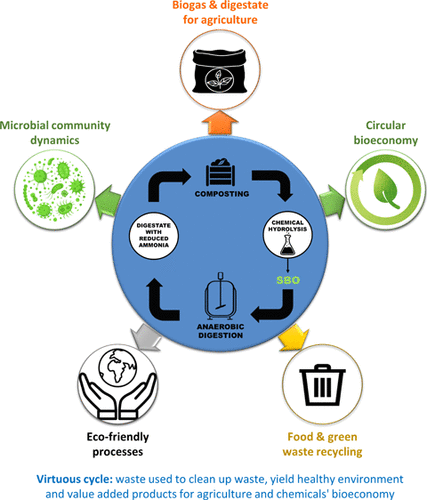当前位置:
X-MOL 学术
›
ACS Sustain. Chem. Eng.
›
论文详情
Our official English website, www.x-mol.net, welcomes your
feedback! (Note: you will need to create a separate account there.)
Integrated Chemical Biochemical Technology to Reduce Ammonia Emission from Fermented Municipal Biowaste
ACS Sustainable Chemistry & Engineering ( IF 7.1 ) Pub Date : 2021-06-15 , DOI: 10.1021/acssuschemeng.1c00689 Panagiota Photiou 1 , Michalis Kallis 1 , Charis G. Samanides 1 , Ioannis Vyrides 1 , Elio Padoan 2 , Enzo Montoneri 3 , Michalis Koutinas 1
ACS Sustainable Chemistry & Engineering ( IF 7.1 ) Pub Date : 2021-06-15 , DOI: 10.1021/acssuschemeng.1c00689 Panagiota Photiou 1 , Michalis Kallis 1 , Charis G. Samanides 1 , Ioannis Vyrides 1 , Elio Padoan 2 , Enzo Montoneri 3 , Michalis Koutinas 1
Affiliation

|
A new eco-friendly process is reported, the implementation of which at the EU level could reduce ammonia and greenhouse gas emissions from fermented biowaste by over 1 Gt yr–1. The present work reports the case study of municipal biowaste (MBW). The process is based on the use of soluble bio-organic substances (SBOs) as auxiliaries in the anaerobic fermentation of MBW to produce biogas and digestate with reduced ammonia content. The SBO-assisted process enables a virtuous biowaste cycle, where MBW is sequentially fermented under anoxic conditions, the digestate is composted, and the compost generated is hydrolyzed, yielding SBO, which is recycled to the anaerobic fermentation reactor at 0.2% concentration. The results show that depending on the MBW source, fermentation inoculum, and SBO concentration in the fermentation slurry, about 40% reduction of ammonium in the digestate is achieved, whereas the control fermentation without SBO exhibits up to 11% ammonia increase. The microbial community and biogas production are not significantly affected by SBO addition. The data are consistent with biological and chemical processes occurring in SBO-assisted fermentation. These comprise ammonia production by protein hydrolysis catalyzed by proteolytic bacteria and ammonia oxidation to N2 catalyzed by SBOs. The results confirm the benefit provided by the use of SBOs to reduce the environmental impact of biowaste. These encourage the implementation of SBO-assisted fermentation in the real operational environment.
中文翻译:

综合化学生化技术减少发酵城市生物垃圾中氨的排放
据报道,一种新的环保工艺,在欧盟层面的实施可以减少来自发酵生物废物的氨和温室气体排放量超过 1 Gt yr –1. 目前的工作报告了城市生物废物 (MBW) 的案例研究。该工艺基于在 MBW 厌氧发酵中使用可溶性生物有机物质 (SBO) 作为助剂来生产沼气和降低氨含量的消化物。SBO 辅助工艺实现了良性生物废物循环,其中 MBW 在缺氧条件下依次发酵,消化物被堆肥,产生的堆肥被水解,产生 SBO,SBO 以 0.2% 的浓度循环到厌氧发酵反应器。结果表明,根据 MBW 来源、发酵接种物和发酵浆液中 SBO 的浓度,可实现消化物中铵约 40% 的减少,而没有 SBO 的对照发酵表现出高达 11% 的氨增加。SBO添加对微生物群落和沼气产量没有显着影响。数据与 SBO 辅助发酵中发生的生物和化学过程一致。这些包括通过蛋白水解细菌催化的蛋白质水解产生氨和氨氧化成 N2由 SBO 催化。结果证实了使用 SBO 来减少生物废物对环境的影响所带来的好处。这些鼓励在实际操作环境中实施 SBO 辅助发酵。
更新日期:2021-06-28
中文翻译:

综合化学生化技术减少发酵城市生物垃圾中氨的排放
据报道,一种新的环保工艺,在欧盟层面的实施可以减少来自发酵生物废物的氨和温室气体排放量超过 1 Gt yr –1. 目前的工作报告了城市生物废物 (MBW) 的案例研究。该工艺基于在 MBW 厌氧发酵中使用可溶性生物有机物质 (SBO) 作为助剂来生产沼气和降低氨含量的消化物。SBO 辅助工艺实现了良性生物废物循环,其中 MBW 在缺氧条件下依次发酵,消化物被堆肥,产生的堆肥被水解,产生 SBO,SBO 以 0.2% 的浓度循环到厌氧发酵反应器。结果表明,根据 MBW 来源、发酵接种物和发酵浆液中 SBO 的浓度,可实现消化物中铵约 40% 的减少,而没有 SBO 的对照发酵表现出高达 11% 的氨增加。SBO添加对微生物群落和沼气产量没有显着影响。数据与 SBO 辅助发酵中发生的生物和化学过程一致。这些包括通过蛋白水解细菌催化的蛋白质水解产生氨和氨氧化成 N2由 SBO 催化。结果证实了使用 SBO 来减少生物废物对环境的影响所带来的好处。这些鼓励在实际操作环境中实施 SBO 辅助发酵。











































 京公网安备 11010802027423号
京公网安备 11010802027423号